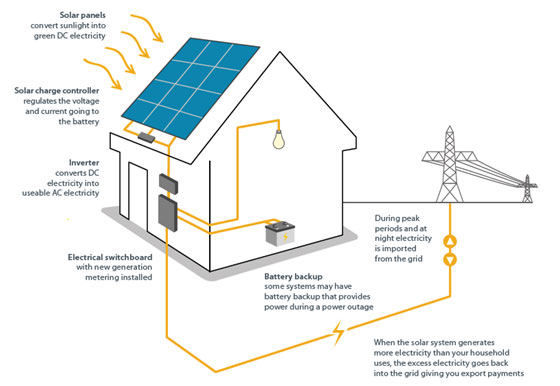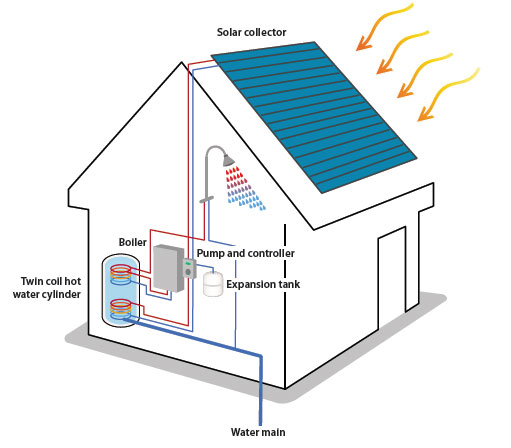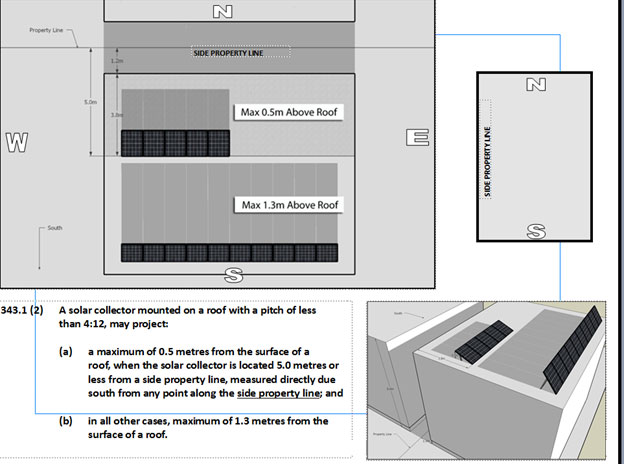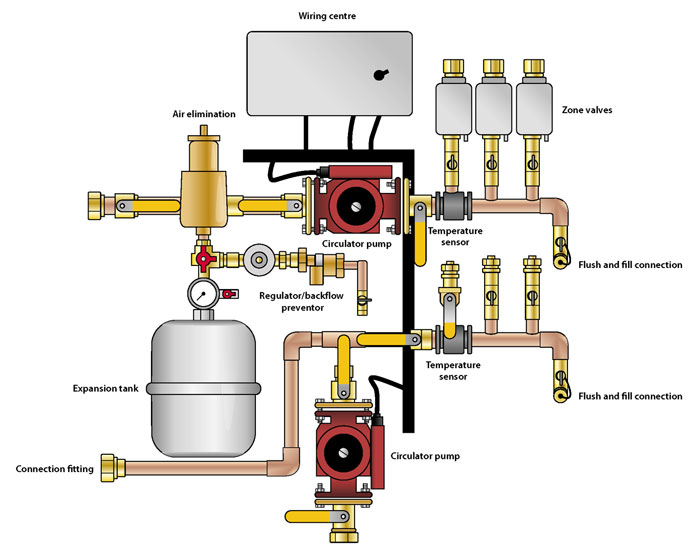Residential solar collectors
-
Review rules and fees
-
Prepare the checklist
-
Apply online
-
Book an inspection
The City is working to make installing solar collection equipment easier, while respecting the interests of the community. The City has designed rules to allow citizens to use solar equipment, while ensuring the impact on adjacent neighbours is limited.
Step 1: Review the rules for your project
It is the property owner’s responsibility to calculate the system’s access to sunlight. This includes taking into account the surrounding plant life, your current neighbours and the eventual development of nearby areas.
Sample drawings

Photovoltaic solar collector
Photovoltaic solar collectors, commonly known as solar panels, convert sunlight directly into electricity. The excess electricity may be stored in batteries or is exported into the main electrical utility system.
These solar collectors can only be wall- or roof-mounted.

Land Use Bylaw rules
A development permit is not required to install a solar collector when the installation follows the rules of the Land Use Bylaw and the property is not on The City’s inventory of potential heritage sites (refer to Section 25(1) (n) in the Land Use Bylaw). To determine your specific land use district, search your home address in the property information tool.
Note: It is the responsibility of the applicant to ensure that the work being carried out conforms to any restrictive covenants, caveats or other restrictions that are registered on the land title.
Low density residential districts
A solar collector mounted on a wall:
- Must be located a minimum of 2.4 m above grade; and
- May project a maximum of
- 1.5 m from the surface of that wall, when the wall is facing a rear property line and;
- In all other cases, 0.6m from the surface of that wall.
A solar collector mounted on a roof:
- Must not extend beyond the outermost edge of the roof.
- With a pitch of less than 4:12, may project:
- A maximum of 0.5 m from the surface of a roof, when the solar collector is located 5.0 m or less from a side property line, measured directly south from any point along the side property line.
- All other cases may project a maximum of 1.3 m from the surface of a roof.
- With a pitch of 4:12 or greater may project a maximum of 1.3 m from the surface of a roof.
Please refer to Section 343.1 in the Land Use Bylaw.
Multi-residential districts
A solar collector mounted on a wall:
- Must be located a minimum of 2.4 m above grade; and
- May project a maximum of 0.6 m from the surface of that wall.
A solar collector mounted on a roof with a pitch of less than 4:12 may project from the surface of the roof:
- A maximum of 2.0 m.
- A minimum of 1.0 m from the edge of the roof.
A solar collector mounted on a roof with a pitch of 4:12 or greater may project a maximum of 1.3 m from the surface of the roof and must not extend beyond the outermost edge of the roof.
Please refer to Section 571.1 of the Land Use Bylaw.
Commercial, industrial and special purpose districts
A solar collector mounted on a wall:
- Must be located a minimum of 2.4 m above grade; and
- May project a maximum of 0.6 m from the surface of that wall.
A solar collector mounted on a roof with a pitch of less than 4:12 may project from the surface of the roof a maximum of 2.0 m.
A solar collector mounted on a roof with a pitch of 4:12 or greater may project a maximum of 1.3 m from the surface of the roof and must not extend beyond the outermost edge of the roof.
Please refer to Sections 699.1; 904.1; 1019.1 of the Land Use Bylaw.

Solar collector placement
Please note: If a development permit is required, it must be approved before you can apply for a building permit.
Electrical rules
- Photovoltaic collectors require an electrical permit and must be installed by a licensed and registered electrical contractor in Calgary. Solar installers are licensed electricians that have taken additional training to understand, design and install solar PV systems. In Alberta, installers must be certified electricians or registered apprentices working under the supervision of a certified electrician that comply with the Electrician Trade Regulation 274/2000 and Apprenticeship and Industry Training Act., and any applicable trade regulations.
- Some electricians have an additional solar-specific certification via CSA, CSI, the North American Practitioners, and NAIT Renewable Energy Program etc. This is not required of your installer, but electricians with such certification are available in Alberta, should you wish to hire one. Visit cansia.ca and solaralberta.ca/company-directory to find solar providers and learn more about solar installation.
Plumbing and gas rules
Single wall heat exchangers can be used where there are no chemicals or non-toxic chemicals added. Refer to CSA-B214 regarding installation codes for hydronic heating systems.
Double wall heat exchangers are required when toxic chemicals have been added and allows a visible means of leak detection. The chemicals must be compatible with the heat transfer fluid. Heat transfer liquid and heat exchangers must comply with code CSA-F379.1 (Alberta Government requirements for Solar Domestic Hot Water Systems).
Since there is wide selection of solar thermal systems, all installations must be must be a packaged system, designed by an accredited engineer and have stamped drawings and heat loss calculations included with the application. They will require a plumbing permit and follow the applicable codes stated in the National Plumbing Code of Canada, CAN/CSA codes F379.1-09 (Packaged solar domestic hot water systems) and CAN/CSA-F383 (Installation of packaged solar domestic hot water systems).

Simple packaged system
When is a development permit required?
If a development permit is required, this must be applied for and approved prior to building permit and solar permit applications. Solar photovoltaic systems (commonly known as a power generation facility) will require a development permit, if they do not follow the Land Use Bylaw rules. Solar thermal collectors do not generate electricity, so they are not considered a power generation facility and usually do not require a development permit.
Development permits
When is a building permit required?
A building permit may be required to install solar collectors if the solar collector is large (approximately 10 kg/m2), since the existing structure may not have been designed to hold the additional weight.
Please refer to the Sustainable Technologies Permitting Matrix for further information.
When is a solar trade permit required?
Solar permits are required for electrical, plumbing, gas or mechanical work and can only be submitted by specific qualified contractors. This work will be inspected by safety code officers to ensure code compliance.
Solar trade permits
Below are the specific contractor application requirements for solar collectors and fee schedules:
- Solar photovoltaic electrical Permit
- Solar thermal (hot water) plumbing permit
- Solar air mechanical permit
- 2017 building and trade permit fee schedule
- Trade permit fee estimator
An electrical permit will also be required for thermal collectors, if pumps are required.
For inquiries regarding specific codes mentioned, please contact the Technical Assistance Centre.
Step 2: Prepare your application
- Use the Solar panel permit checklist to determine the application and drawing requirements for your project.
- For online applications, review the criteria for information on how to organize your plans and documents
Step 3: Apply
To apply online, you need a myID account. Create a myID account
-
apply.calgary.ca
Apply in person
Drop off your application at
3rd floor, Municipal building
800 Macleod Trail SE
See COVID-19 Service Changes - Application drop-off for payment options.
We are currently not accepting appointments.
Complete Application Requirement:
An application for a permit may be refused if, within ninety (90) days from the date of receipt, adequate information and documentation is not supplied as requested by the Safety Codes Officer. Should a permit be considered for refusal the applicant will be given notification in writing and 30 days to resubmit the missing information. For more information, please review Building Advisory A19-002 Building Permit Complete Application.
Step 4: Inspections and managing your permit application
Homeowners book an inspection – For solar domestic hot water heaters only
Homeowners can book inspections for:
- Building permits
- Electrical permits
- Plumbing permits
Inspections occur Monday to Friday from 8 a.m. to 4 p.m.
Book Online using the Inspections Booking System
Homeowners who have applied for their permits through apply.calgary.ca, can book and manage their inspections through the Inspections Booking System using their myID account. Our enhanced website provides a more streamlined experience for homeowners to better manage their inspections. Homeowners can book, reschedule or cancel their inspections all through the online tool.
If you do not have a myID account, you can sign up for one at calgary.ca/myid.
Support
Call the Inspections Call Centre if you experience any difficulties with the Inspections Booking System, or setting up a myID business account. You can reach them at 403-268-5311, from 7 a.m. to 4:15 p.m. Monday to Friday.
Contractors book an inspection – For solar photovoltaic only
All inspections must be booked online through the Inspections Booking System.
Our enhanced Inspections Booking System provides a more streamlined experience for all contractors to better manage their inspections. Contractors can book, reschedule or cancel their inspections through this system.
Please note, inspections can be booked up to 10 business days in advance and occur Monday to Friday from 8 a.m. to 4 p.m. The City continues to do our best to accommodate booking requests, however some dates may be unavailable due to inspection capacity.
ePermit
Login to ePermit at calgary.ca/vista, or use the Inspections Booking System.
- Book, reschedule and cancel
- Receive instant scheduling confirmation
- View inspections required for each project phase
- View inspection results and reports online
- View inspection status
Vista
Login to Vista with a user ID or Job Access Code (JAC)
- Book phase inspections only
- No rescheduling or cancellation ability
- View inspection status
Online Booking
All contractors must book their inspections online through the Inspections Booking System.
Using the Inspections Booking System requires a myID business or VISTA account. Contractors that do not have a myID business account can set one up by visiting calgary.ca/myid. To learn more about or apply for a VISTA account, visit vista.calgary.ca.
Call the Inspections Call Centre if you experience any difficulties with the Inspections Booking System or setting up a myID business account. You can reach them at 403-268-5311, 7 a.m. to 4:15 p.m. Monday to Friday.

